
We just finished a round of quarterly radio earnings calls where most CEO’s touted the power of radio and how it has held its ground when compared to how traditional TV viewership and newspaper readership are being shattered. But is that really the truth?
Fred Jacobs revealed the Jacobs media 2022 Jacobs Media Tech Survey Tuesday afternoon. The presentation called Radio: A Return to Normal did not include great news for the radio industry. Over 30,000 radio listeners from 474 radio stations participated. Here’s what they said about radio…
Right out of the gate the survey shows that radio listening is trending down and its the lowest among the younger generations.
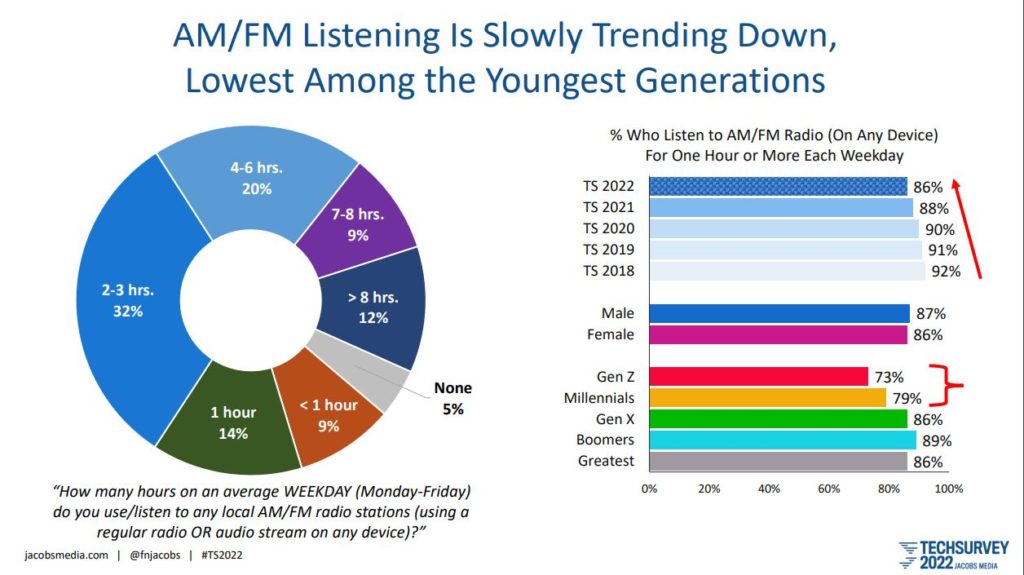 Also trending down for radio is music discovery, something the radio industry has been touting as one of its biggest strengths for decades.
Also trending down for radio is music discovery, something the radio industry has been touting as one of its biggest strengths for decades.
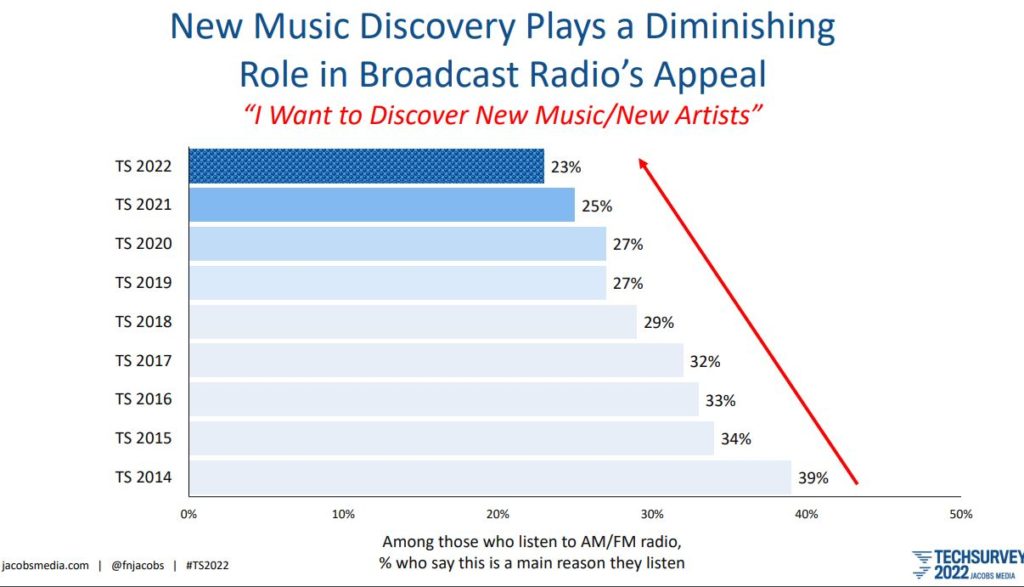
In a connected vehicle, bluetooth is now the most important option in the dash.
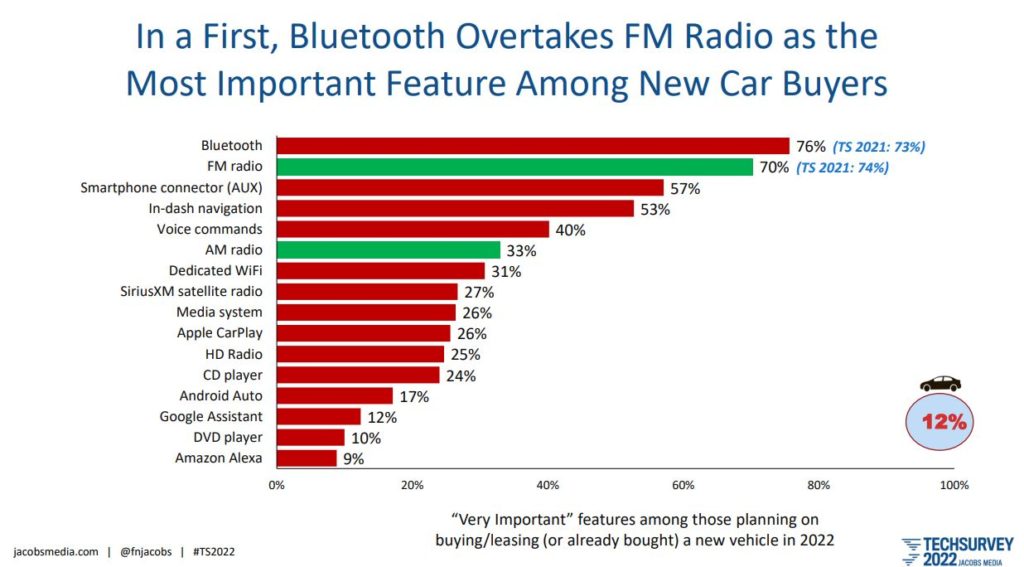
Which could be one of the reasons in-car listening is eroding.
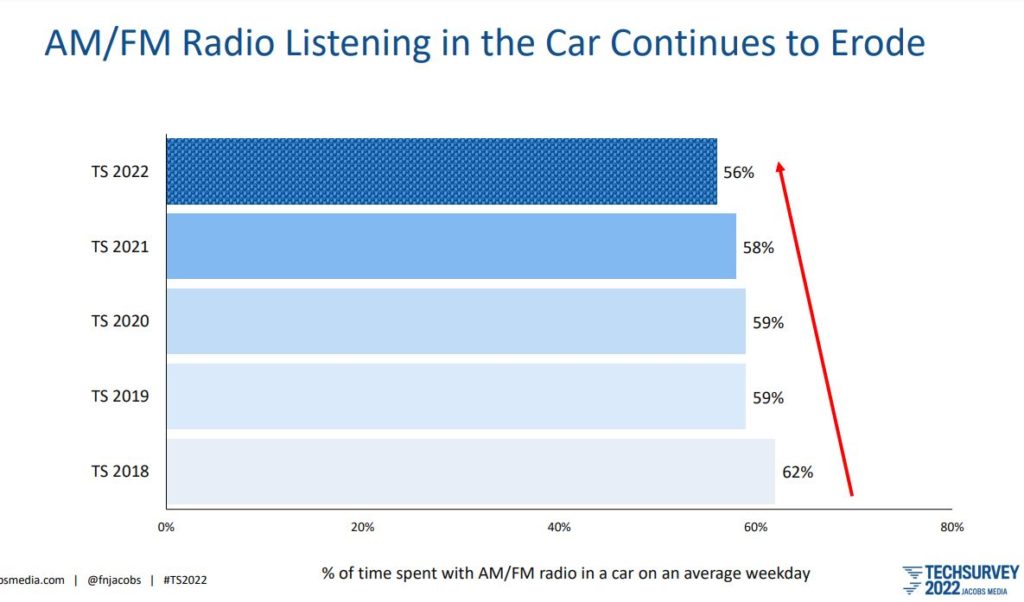 We reached out to Fred Jacobs for his take on the results and what radio needs to do to reverse its declining trends. He said TechSurvey 2022 is an honest report that clearly maps out radio’s challenges, but also, opportunities. “On the one hand, the growing dependence on digital streaming is a chance to keep up with the technology and win over listeners. But the industry needs to do a better job of leaning into its strengths – personality, local, and the good side of habit-forming listening.”
We reached out to Fred Jacobs for his take on the results and what radio needs to do to reverse its declining trends. He said TechSurvey 2022 is an honest report that clearly maps out radio’s challenges, but also, opportunities. “On the one hand, the growing dependence on digital streaming is a chance to keep up with the technology and win over listeners. But the industry needs to do a better job of leaning into its strengths – personality, local, and the good side of habit-forming listening.”
He adds that the decline in radio listening is “driven by new technology that offers commercial-free music for a monthly fee, on-demand programming, and radio offering a less than optimal experience. My biggest long-term concern is erosion in cars, still radio’s #1 listening location. COVID lockdowns and WFH hurt, and because connected cars offer a conduit to satellite radio and any content on a smartphone, the challenge gets tougher with each passing year.
Fred’s top takeaway from the survey was COVID giveth & COVID taketh away. “Great stations made lasting connections with audiences during the pandemic. But we are still a good distance away from “normal.” Traffic and commuting levels are still lower than they were in 2019, and that takes its toll on radio listening.”
So how radio need to do to reverse the trend of listeners jumping ship to other options like SiriusXM or their bluetooth device? “My point with the new question series – “Radio vs. Everybody” – is to raise industry awareness that we’re not just competing with other radio stations, groups, and companies. Radio broadcasters need to identify their defining differences, and invest in them. With new competition, the bar is raised. Broadcasters cannot offer substandard experiences, and expect to come out on top. We’ve got to put audiences first, research their needs, and offer the emotional benefits only radio can provide.
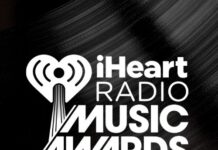
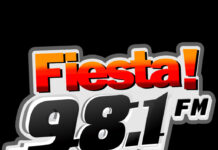


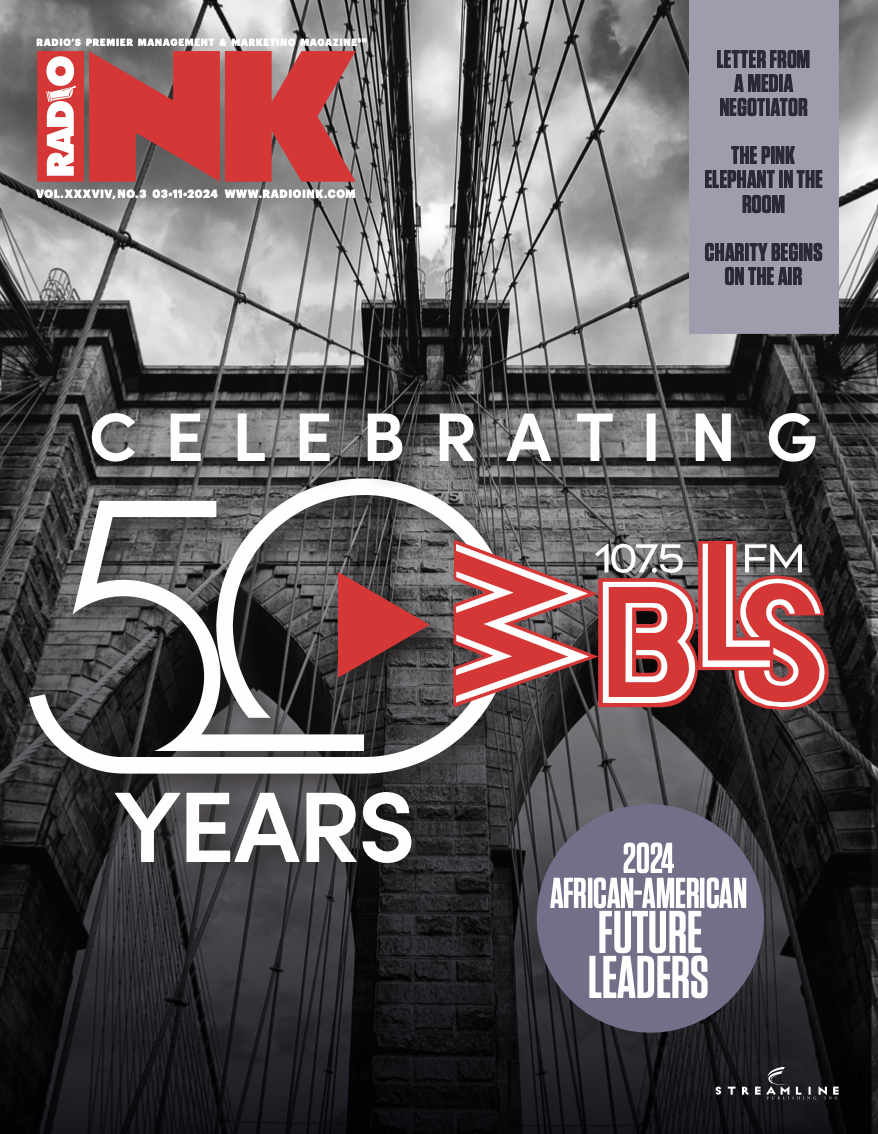

Ironically newspapers and broadcast group owners have largely moved away from the one thing that would distinguish the product and make it more attractive: local content.
Too many commercials, dumb ass morning shows that should insult everybody but the most ignorant of listeners. You would think Pink Floyd only ever made 4 songs, RUSH 2 songs, etc etc. Its dead. You can thank the Corporate goons.
Radio is ran like a corporate big box retail store. You been to one Costco, Best Buy, Kohl’s…..you been to them all. With an exception or two where certain items are only available at this location. It’s not just radio’s fault…its what goes hand in hand with it. Its the music industry as well. Look what’s coming out in CHR. Bland, tensed, drama, computerized sampled cookie cutter crap.
Just looking at the current playlist crop of artist, for example…NICKI MINAJ & ICE SPICE Barbie World. Is that a hit? REMA & SELENA GOMEZ
Calm Down…..yes it’s number 1. But it’s a song you just hate to like. But it seems you don’t have a choice. Olivia Rodrigo….Vampire , Drivers License….Does this make you wanna wake up and drive to work? Lewis Capaldi…..listen to his music all day. You will wanna commit suicide. Along with today’s CHR or current hit music stations, They imaging is bland, too safe, and it has no staying power. I would go on all day , but I don’t have th time. Now you want to know why people listen to Classic hits.
You English is atrocious.
Radio has had to reinvent itself before and I think there’s a tremendous opportunity to fill a void, hiding in plain site. But first let me say music and music discovery is a need better filled by streaming services like Apple Music and Spotify. For less than at the price of 6 CDs each year, I have access to the entire catalog of popular music, with no commercials or other interruptions. So, music would not be the primary draw. The opportunity is presented by the collapse of the newspaper industry which, like radio, can’t seem to understand what business they’re in. Newspapers have all but eliminated journalists from their budget but every time I go to a local chamber mixer there’s a table of 10 filled with ad sales people. They have their priorities upside down. And how is it that social media sites sell billions of dollars in advertising with a self-service model? Anyway, when newspapers started downsizing, the first people to go were the local reporters. Subscribers are far more interested in what’s happening in their own back yard than what’s happening in a foreign country. Again, publishers are looking through the wrong end of the telescope. But local happenings are the Holy Grail for radio. Forget those 15-, 30- and 60-second spot announcements. Sell advertorials. Magazines figured out this gambit long ago. Create editorial content that pays for itself. What does this look like on any music format station? Assume 5 stop sets per hour at :05, :17, :29, :41 and :53. At each break you air personality gives the usual radio business (time, temp, name of the song) then has a 90-second advertorial interview with an in-studio guest. Maybe it’s a local chef talking about outdoor grilling in one hour and the next hour is a local home improvement store talking about how to buy an outdoor grill. Your talent could voice track a whole week in a couple of hours. This is a much better buy for the advertiser, premium content for the audience and a money-maker for the station. A WIN-WIN-WIN. And actually, a multi-station group could use this same content across formats.
hard core, born in radio dirt..in the business training at 12, hired at 17 full time while a junior in hs..love, love, love radio… graduated thru the ranks from an ’72 dj to market manager, retired in 2019.
My point is I’m die hard ,however today I ha e a satellite subscription and haven’t tuned into my local station in…I don’t know how long. When I did, I didn’t hear any local, upbeat fun sounding information sharing announcer giving me anything of local importance or relevance.
Return to local announcers who are from our communities who care about what happens in the community.
The ground that vessels like satellite, social media, streaming, and so much more has diluted any media’s effectiveness.
Radio has a different set of issues, covid made it worse and the industry has been slowly attempting to reclaim some of its past glory. Possible perhaps with a return to local. Did you hear about the new york station that’s dumping all of its syndicated programming and mindset to go after a competitor who has been successfully programming local for years..wonder why
As a now former radio guy (22 years in the game) I can say that the only hope the business has is to take the restraints off the talent. Locking jocks into liner reader roles as opposed to forward thinking, edge-of-the-envelope entertainers have made radio boring, sterile, predictable, and easily ignored.
At a recent college job fair here in the Seattle market, I had a line of college and high school kids at our table throughout the fair, some looking for paid opportunities, but quite a few were looking for volunteer opportunities. Many “old school” community and college radio stations, like ours, are attracting more listeners and supporters, not less. For us, it’s all local, local, local. Sound familiar?
It’s funny how people SAY they want to discover new music and new artists, and then you look at what they listen to, and it’s all classic rock, classic hits, and adult hits. They say one thing and do another. Watch and see how angry people get if we mix a new song among their classic hits.
It’s funny how so many commentators on here are defensive, and attack the “messenger” (Jacobs) rather than address the research itself. Typical behavior of many in radio — that is, anytime there is potentially “bad news”, they get defensive and hostile, rather than address the information.
“Radio” is such a generic term. Clearly, there are vibrant thriving stations in markets of all sizes, right now. Many, many local owners do a great great job, dedicated to their product and to their market. They are a credit to the industry.
Then…there are the Frankenstein, radio-killing owners…specifically iHeart and most of the corporate behemoths. Their dedication is to debt servicing and executive comoensation. They could care less, that 12, 14, 16 or more commercials in a row literally pushes listeners away from the station…and often to other mediums. They could care less, that voice tracking cancels out any real-time local relevance and real-time local listener interaction.
Corporate-owned stations are treated like commodities, like P+G products. The major market and regional managers at iHeart (and others) are corporate eunichs…glorified “yes men” (and women) to corporate.
So the ongoing success and failure of “radio” is difficult to assess… it depends on the market, and the owner. And until the big corporates leave radio (doubtful that they will, because they cannot recover the prices they paid for the stations), they (corporate owners) will continue damaging their stations, just draining as much revenue as they can from each station, not investing in the stations, and cutting costs (people) to the bone.
They are following the practices of slum landlords.
Nailed it.
RADIO is doing so much better than ANY OTHER traditional media….television,print,magazines. As long as the local radio station is Over the air, ON line, on the Phone(via app) and streaming on Alexa devices…listening to radio will continue to be an important part of our everyday life.
You are a beautiful dreamer.
This reads as if losing the top spot to Bluetooth is the dagger the killed Ceasar. Take into consideration that nearly every state in the US has now passed a law in favor of hands free driving and in fact issues tickets if they see you looking at or talking on a phone. The need for BT may not just be for listening to music that isn’t radio. We do need to do a better job with young people.
The Radio Industry has been declining, steadily. It’s a boring media that is only talked about during emergency weather events. Advertisers are starting to wake up and move their money.
Radio would benefit if it got back to unbiased reporting, went back to serving the American people, stopped pushing rogue governments, the WHOs, and the WEFs propaganda. I wonder what would happen if Joe Rogen was on the radio.
Content is king, right?
The only thing killing radio is the corporations running the stations (or should I say ruining the radio stations). If these broadcasters would make radio exciting like it used to be, listening would thrive. Most stations are so automated that there are no longer: requests, dedications, shout outs or contests. They have forgotten how to engage with the listener.
In the face of a tech revolution radio is still popular with more than half of the population and this is “bad” news? Bluetooths importance in vehicles is no shock. Many communities have banned hand held cellphone use so it’s a have to add on. FM radio still gets 70%? Jacobs may be downcast, but we are UPBEAT!
Gen Z’s and younger kids have no interest in radio – in fact they have little knowledge of or interest in it. When they do hear radio, the long spot breaks turn them off. And I mean, they hate it and won’t tolerate all those ads. This is a generation used to being able to skip an ad after 5 seconds. They’re used to on demand content. And radio, as an industry, is nowhere with them. Meanwhile, radio pisses off their most loyal listeners (boomers) by aging them out. You can whistle through the graveyard all day but radio is slowly dying.
Gen Z from 2000 here. I’m a passion radio and late 00’s guy obsessed with VHS tapes still and is sick of only new school shit and misses the fun days of old and new coexisting and more exciting things going on with all forms of media.
We’re a rare minority. 😉